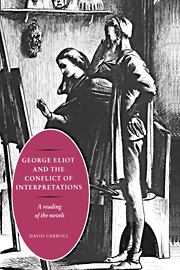Book contents
- Frontmatter
- Contents
- Preface
- Introduction: a working hypothesis
- 1 Scenes of Clerical Life: familiar types and symbols
- 2 Adam Bede: pastoral theodicies
- 3 The Mill on the Floss: growing up in St Ogg's
- 4 Silas Marner: rustic hermeneutics
- 5 Romola: duplicity, doubleness, and sacred rebellion
- 6 Felix Holt: commentaries on the apocalypse
- 7 Middlemarch: empiricist fables
- 8 Daniel Deronda: coercive types
- Conclusion
- Notes
- Index
Conclusion
Published online by Cambridge University Press: 17 August 2009
- Frontmatter
- Contents
- Preface
- Introduction: a working hypothesis
- 1 Scenes of Clerical Life: familiar types and symbols
- 2 Adam Bede: pastoral theodicies
- 3 The Mill on the Floss: growing up in St Ogg's
- 4 Silas Marner: rustic hermeneutics
- 5 Romola: duplicity, doubleness, and sacred rebellion
- 6 Felix Holt: commentaries on the apocalypse
- 7 Middlemarch: empiricist fables
- 8 Daniel Deronda: coercive types
- Conclusion
- Notes
- Index
Summary
Lord Acton praised George Eliot for knowing uniquely how to think or feel as people do who live ‘in the grasp’ of various systems of thought and belief. It will be clear that one of the aims of this study has been to show that much of the narrative energy of George Eliot's fiction comes from the dismantling of these same theories of life which seek, as they must, to escape their own provisional nature. Whether they are expressed as religious truths, theodicies, family codes of practice, founding historical myths, political programmes, models of vocation, or class ideologies – all are subjected to the hermeneutic of suspicion which reveals their inner contradictions. Representation and interpretation proceed simultaneously. The fictional experiments which elicit these disconfirmations are various, but an essential feature of any comprehensive world-view in George Eliot's fiction is the inevitability of its self-deconstruction. One form, in particular, of the novelist's double hermeneutic epitomises this irony: that in which a character is subjected to his or her own interpretative language and concepts. Whether the narrator is diagnosing the doctors, experimenting on the scientists, or carrying out exegesis on the clergymen, the depth of the irony is proportional to their claims to comprehensiveness.
Individuals, families, societies, are all subjected to the same rigorous scrutiny. In the earlier novels, the relatively stable communities are disturbed by the arrival of aliens, hybrids, or anomalies who challenge the status quo. At first ostracised or marginalised, these characters eventually elicit and act out the contradictions within the community which comes in this way to an understanding of its own incarnate history. Then the community is able once more to stabilise its view of the world.
- Type
- Chapter
- Information
- George Eliot and the Conflict of InterpretationsA Reading of the Novels, pp. 313 - 315Publisher: Cambridge University PressPrint publication year: 1992



